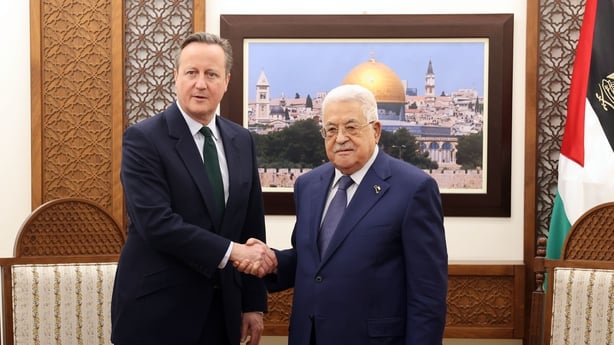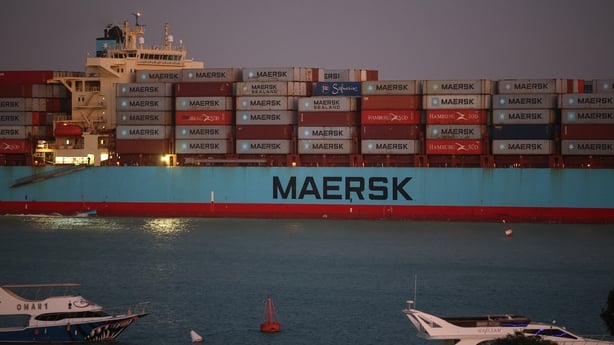Britain and the United States said they had imposed co-ordinated sanctions on four key Houthi figures for their roles in supporting or directing attacks on commercial shipping in the Red Sea.
Attacks by the Iranian-backed Houthis have disrupted global shipping and stoked fears of global inflation. They have also deepened concern that fallout from the Israel-Hamas war could destabilize the Middle East.
Those sanctioned were Houthi Defence Minister Mohamed Nasser al-Atifi, Commander of Houthi Naval Forces Muhammad Fadl Abd Al-Nabi, coastal defence forces chief Muhammad Ali al-Qadiri and Muhammed Ahmad al-Talibi, who the two governments described as the Houthi forces' director of procurement.
"With our allies, we will continue to target those responsible for the Houthis' unacceptable and illegal actions, which risk innocent seafarers’ lives and disrupt aid deliveries to the Yemeni people," British Foreign Secretary David Cameron, who is on a visit to the Middle East, said in a statement.
The sanctions aim to disrupt their ability to carry out attacks on Red Sea shipping and promote the peace, stability and security of Yemen, Britain said.
The US Treasury said al-Atifi had publicly warned the Houthis would turn the Red Sea into a graveyard in response to any perceived action against Yemen by the US-led naval coalition aimed at helping safeguard commercial traffic.
Al-Talibi is involved in efforts to smuggle Iranian-provided weapons, missiles, drones and other items into Yemen, the US said.

"The Houthis' persistent terrorist attacks on merchant vessels and their civilian crews ... threaten to disrupt international supply chains and the freedom of navigation, which is critical to global security, stability, and prosperity," US Treasury Under Secretary for Terrorism and Financial Intelligence Brian Nelson said in a statement.
"Today’s joint action with the United Kingdom demonstrates our collective action to leverage all authorities to stop these attacks."
The US action freezes any US-based assets of those targeted and generally bars Americans from dealing with them. Britain said they would be subject to asset freezes, arms embargoes and travel bans.
On Monday, US and British forces carried out a new round of strikes in Yemen, targeting a Houthi underground storage site as well as missile and surveillance capabilities used by the Iran-aligned group against Red Sea shipping.
Earlier, shipping company Maersk said that explosions forced two of its ships to turn around when they were transiting the Bab al-Mandob Strait off Yemen, accompanied by the US Navy.
The firm said the vessels - operated by its US subsidiary - were carrying US military supplies.
"While en route, both ships reported seeing explosions close by and the US Navy accompaniment also intercepted multiple projectiles," Maersk said in a statement, adding it was suspending Red Sea transits by vessels of the US subsidiary.
A spokesperson for Yemen's Houthi military forces said they fired ballistic missiles at several American warships that were protecting two US commercial vessels.
Both ships are operated by Maersk Line Limited (MLL), the US subsidiary that carries cargo for the Department of Defense, Department of State, USAID, and other US government agencies.
Both are enrolled in the Maritime Security Program (MSP) and Voluntary Intermodal Sealift Agreement (VISA) with the US government, which is why they were escorted through the strait by US Navy vessels, Maersk said.

MSP and VISA are programmes run by the US Department of Defense to transport forces, supplies and equipment during times of war or national emergency.
The vessels and crew were unharmed and were being escorted back to the Gulf of Aden by the US Navy, Maersk said.
Bab al-Mandab is the outlet of the Red Sea, between Yemen on the Arabian Peninsula, and Djibouti and Eritrea on the African coast.
Houthi military spokesperson Yahya Sarea said in a statement that its forces targeted a number of US warships with ballistic missiles yesterday in a "clash" that lasted more than two hours and led to a US warship being directly hit and the two commercial vessels having "to withdraw and return".
"Several of our ballistic missiles struck their targets despite warships' attempts to intercept them," the statement said.
A US official said that no ships were hit.
Separately, Houthi forces fired three anti-ship ballistic missiles toward the US-flagged container ship Maersk Detroit yesterday as it was transiting the Gulf of Aden, the US Central Command said.
There were no reports of injuries or damage to the ship, it added in a statement.
Maersk shipping suspended because of 'escalation of risk'
On 5 January, Maersk said it would divert its container vessels away from the Red Sea for the foreseeable future.
Until yesterday, MLL ships were the exception, but that would no longer be the case, the company added.
"Following the escalation of risk, MLL is suspending transits in the region until further notice," it said.
Seafarers remain in the firing line, and have signed agreements to receive double pay when entering the high-risk zones.
"There's a feeling of vulnerability," General Secretary of the International Transport Workers' Federation Stephen Cotton said.
"The feedback from the (ship) captains is certainly on the container trades, they are much happier to go around the Cape."
US maritime labour organisations have been separately concerned about the impact on American-flagged ships, which in recent weeks have been subjected to what nine unions called "the most significant attacks on the United States Merchant Marine in more than half a century".
"It is critically important that US-flag vessels carrying commercial, military and foreign aid cargoes are provided the necessary protection from the United States military as they transit the increasingly treacherous waters of the Red Sea," the unions wrote in a 19 January letter to the US Transport Command.

